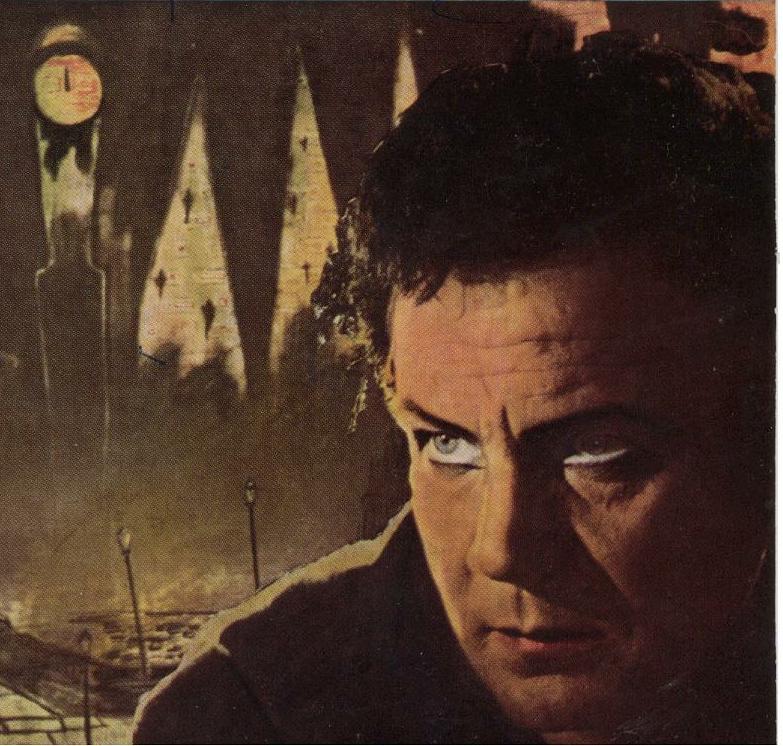Rudolf Schock
Schock was born into a bitterly poor family, and that his father died early didn't ease the situation. He had
no shoes until about 14 years old. He trained as a hairdresser; singing was his sparetime passion.
That his mother worked at the Duisburg theater as a wardrobe lady made it possible that Schock, at age 19, was accepted into the
opera choir. Only now, he took voice lessons (with Laurenz Hofer, among others). In 1936,
he got to sing his first solo parts in Duisburg, and was accepted into the Bayreuth Festival choir. The following year,
he got a solo contract in Braunschweig. There he stayed until being drafted in 1940; he had to fight the rest of WWII,
although he could take the occasional leave to sing opera.
After the war, he worked as a farm hand for a short while before being called to the Hannover theater, and soon to the Berlin
Staatsoper (1946–50). From 1947, he was also a member of the Hamburg opera (until 1961, with a short interruption),
1950–53 Komische Oper Berlin, 1952–60 Vienna Staatsoper.
In the 1960s, he gradually reduced his stage activity – he was already one of Germany's most
popular singers, a radio, TV, record and film celebrity, and a regular in the society columns. His career continued into the late
1970s.
His remarkable stage career notwithstanding, he seems to have shined more on the radio and on record. The microphone obviously
loved his voice, which a senior opera expert, who saw him multiple times in Vienna, described to me as small and unimpressive in
the theater. This is surprising, judging from his recordings; while many of them (Schock was one of the most prolific recording
artists of all times) are plain ugly, there is also a great number of excellent recordings by him, both in the lyrical and the
dramatic repertory. Among the above soundfiles, you have three examples of rather ungainly singing because of Historical Tenors'
obsession with collecting all available Di quella pira versions; that aria was clearly not Schock's forte. The other
three recordings, however, explain Schock's success.
Fidelio (Erster Gefangener) – Duisburg, 1934 Die Zauberflöte (Erster Priester) – Duisburg, spring 1936 Il trovatore (Messaggero) – Duisburg, spring 1936 Die lustige Witwe (Rosillon) – Duisburg, spring 1936 Aida (Messaggero) – Duisburg, spring 1936 Die Zauberflöte (Tamino) – Duisburg, 28 September 1936 Der Barbier von Bagdad (Nureddin) – Duisburg, 1 October 1936 Das Rheingold (Froh) – Duisburg, 16 October 1936 Fidelio (Jaquino) – Duisburg, 20 October 1936 Die Tatarin (Kavalier) – Duisburg, 25 October 1936 (composer: Stauch) Ariadne auf Naxos (Bacchus) – Duisburg, 1 December 1936 Die Meistersinger von Nürnberg (Vogelsang) – Duisburg 30 January 1937 La traviata (Alfredo) – Duisburg, 27 February 1937 Boris Godunov (Grigorij) – Duisburg, 27 April 1937 Die beiden Schützen (Gustav) – Braunschweig, 12 October 1937 (composer: Lortzing) Die Landstreicher (Roland) – Braunschweig, 1937 (composer: Ziehrer) Der Rosenkavalier (Sänger) – Braunschweig, 1937 Schwarzer Peter (Roderich) – Braunschweig, 25 December 1937 (composer: Schultze) Der Bettelstudent (Jan Janicki) – Braunschweig, 31 December 1937 Così fan tutte (Ferrando) – Braunschweig, 14 March 1938 Die lustigen Weiber von Windsor (Fenton) – Braunschweig, 9 July 1938 Madama Butterfly (Pinkerton) – Braunschweig, 1938 Rigoletto (Duca) – Braunschweig, 1938 Das Land des Lächelns (Sou-Chong) – Braunschweig, 1938 Zar und Zimmermann (Châteauneuf) – Braunschweig, 1938 Faust (Siebel) – Braunschweig, 1938 Její pastorkyňa (Laca) – Braunschweig, 1938 Der fliegende Holländer (Steuermann) – Braunschweig, 1938/9 Il barbiere di Siviglia (Almaviva) – Braunschweig, 27 June 1939 Don Pasquale (Ernesto) – Braunschweig, 1939 Eine Nacht in Venedig (probably Caramello) – Berlin, Theater am Nollendorfplatz, 1944 Martha (Lyonel) – Hannover, 1 September 1945 Prodaná nevěsta (Jeník) – Hannover, 1945 Carmen (José) – Hannover, 11 May 1946 Il trovatore (Manrico) – Hannover, 14 May 1946 Salome (Narraboth) – Hannover, 23 May 1946 Der Wildschütz (Kronthal) – Berlin, Staatsoper, 29 June 1946 Arlecchino (Leandro) – Berlin, Staatsoper, 3 September 1946 (composer: Busoni) Die Entfürung aus dem Serail (Belmonte) – Berlin, Staatsoper, 4 October 1946 Sadko (Indian guest) – Berlin, Staatsoper, 10 April 1947 Les contes d'Hoffmann (Hoffmann) – Berlin, Staatsoper, 16 July 1947 Evgenij Onegin (Lenskij) – Berlin, Staatsoper, 12 October 1947 Tosca (Cavaradossi) – Hamburg, 27 November 1947 Manon (des Grieux) – Berlin, Staatsoper, 27 January 1948 Don Giovanni (Don Ottavio) – Berlin, Staatsoper, 20 June 1948 L'elisir d'amore (Nemorino) – Berlin, Staatsoper, 30 June 1948 La bohème (Rodolfo) – London, 15 October 1948 La forza del destino (Alvaro) – Hamburg, 22 March 1950 Fra Diavolo (Marquis) – Hamburg, 3 May 1951 Idomeneo (Idomeneo) – Salzburg, 27 July 1951 The Rake's progress (Tom Rakewell) – Hamburg, 14 October 1951 Cavalleria rusticana (Turiddu) – Berlin, Staatsoper, 8 December 1951 Don Carlo (Don Carlo) – Hamburg, 23 February 1952 Tristan und Isolde (Junger Seemann) – Berlin, Staatsoper, 15 June 1952 Penelope (Ercole) – Salzburg, 17 April 1954 (world premiere, composer: Liebermann) Manon Lescaut (des Grieux) – Hamburg, 5 October 1954 Lohengrin (Lohengrin) – Braunschweig, 1 September 1957 Die Meistersinger von Nürnberg (Walther von Stolzing) – Bayreuth, 24 July 1959 Si j'étais roi (Zéphoris) – Berlin, Deutsche Oper, 17 March 1960 I vespri siciliani (Arrigo) – Berlin, Deutsche Oper, 28 April 1960 Lulu (Alwa) – Wien, Theater an der Wien, 9 June 1962 Pagliacci (Canio) – Saarbrücken, 8 July 1962 Eine Nacht in Venedig (Guido) – Wien, Volksoper, 21 July 1963 Un ballo in maschera (Riccardo) – Saarbrücken, 25 April 1964 Der Zigeunerbaron (Barinkay) – Wien, Volksoper, 24 May 1965 Tiefland (Pedro) – Wien, Volksoper, 26 January 1966 Der Evangelimann (Matthias) – Wien 30 May 1972
For the repertory: reference 1, reference 2. I wish to thank Helge K. Saebo for one DQP recording. I wish to thank André Wium for the Turandot recording. |
